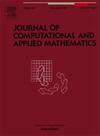基于迁移算子分裂技术的相场表面活性剂模型解耦和能量稳定方案
IF 2.1
2区 数学
Q1 MATHEMATICS, APPLIED
Journal of Computational and Applied Mathematics
Pub Date : 2024-11-15
DOI:10.1016/j.cam.2024.116365
引用次数: 0
摘要
相场表面活性剂(PFS)模型是由两个非线性耦合卡恩-希利亚德(Cahn-Hilliard)型方程组成的梯度流动系统,本文研究了该模型的数值方法。为该系统开发高阶高效能量稳定方法的主要挑战来自自由能函数中两个变量的非线性和强耦合。我们基于线性稳定方法和算子分裂技术,提出了两种完全解耦的线性能量稳定方案。我们严格证明,这两种方案都能保持原有的能量耗散规律。然后,我们将这些方案中采用的技术归纳为一种创新方法,我们称之为移动算子分裂(MOS),用于为各类梯度流系统设计高阶解耦能量稳定方案。作为一种特殊情况,MOS 允许以不同的时间步长更新各自的变量,从而为快慢动力学提供了一种多时间步长策略,从而大大提高了计算效率。本文介绍了各种数值实验,以验证所提方案的精度、效率和其他所需的特性。特别是,使用提出的方案可以清晰地捕捉到薄膜掐断动力学中的详细现象。本文章由计算机程序翻译,如有差异,请以英文原文为准。
Decoupled and energy stable schemes for phase-field surfactant model based on mobility operator splitting technique
In this paper, we investigate numerical methods for the phase-field surfactant (PFS) model, which is a gradient flow system consisting of two nonlinearly coupled Cahn-Hilliard type equations. The main challenge in developing high-order efficient energy stable methods for this system results from the nonlinearity and the strong coupling in the two variables in the free energy functional. We propose two fully decoupled, linear and energy stable schemes based on a linear stabilization approach and an operator splitting technique. We rigorously prove that both schemes can preserve the original energy dissipation law. The techniques employed in these schemes are then summarized into an innovative approach, which we call the mobility operator splitting (MOS), to design high-order decoupled energy stable schemes for a wide class of gradient flow systems. As a particular case, MOS allows different time steps for updating respective variables, leading to a multiple time-stepping strategy for fast-slow dynamics and thus serious improvement of computational efficiency. Various numerical experiments are presented to validate the accuracy, efficiency and other desired properties of the proposed schemes. In particular, detailed phenomena in thin-film pinch-off dynamics can be clearly captured by using the proposed schemes.
求助全文
通过发布文献求助,成功后即可免费获取论文全文。
去求助
来源期刊
CiteScore
5.40
自引率
4.20%
发文量
437
审稿时长
3.0 months
期刊介绍:
The Journal of Computational and Applied Mathematics publishes original papers of high scientific value in all areas of computational and applied mathematics. The main interest of the Journal is in papers that describe and analyze new computational techniques for solving scientific or engineering problems. Also the improved analysis, including the effectiveness and applicability, of existing methods and algorithms is of importance. The computational efficiency (e.g. the convergence, stability, accuracy, ...) should be proved and illustrated by nontrivial numerical examples. Papers describing only variants of existing methods, without adding significant new computational properties are not of interest.
The audience consists of: applied mathematicians, numerical analysts, computational scientists and engineers.

 求助内容:
求助内容: 应助结果提醒方式:
应助结果提醒方式:


